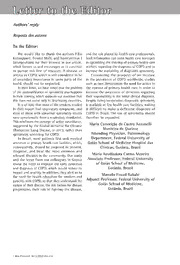
Author's reply . PDF
Preview Author's reply .
Letter to the Editor Authors’ reply Resposta dos autores To the Editor: We would like to thank the authors Filio and the role played by health care professionals. Kotrogianni, Foteini Malli, and Konstantinos I Such information can assist health care managers Gourgoulianis for their interest in our article, in optimizing the training of primary health care which honors us and encourages us to continue workers regarding the diagnosis of COPD and to to pursue this line of research. A disease as increase the availability of diagnostic spirometry. serious as COPD, which is still considered to be Considering the prospect of an increase of secondary importance in some parts of the in the prevalence of COPD worldwide, studies world, should not be neglected. such as ours demonstrate the need for action in In their letter, we have noted that the problem the context of primary health care in order to of the underutilization of spirometry also happens increase the awareness of clinicians regarding in their country, which supports our assertion that their responsibility in the initial clinical diagnosis. this does not occur only in developing countries. Despite being inexpensive, diagnostic spirometry It is of note that most of the smokers studied is available at few health care facilities, making in their report had respiratory symptoms, and it difficult to make a definitive diagnosis of most of those with abnormal spirometry results COPD in Brazil. The use of spirometry should were symptomatic from a respiratory standpoint. therefore be expanded. This reinforces the concept of active surveillance, Maria Conceição de Castro Antonelli suggested by the Global Initiative for Chronic Monteiro de Queiroz Obstructive Lung Disease, in 2013, rather than Attending Physician, Pulmonology spirometry screening for COPD. In Brazil, most patients first seek medical Department, Federal University of attention at primary health care facilities, which, Goiás School of Medicine Hospital das consequently, should be prepared to prevent, Clínicas, Goiânia, Brazil diagnose, and treat the most common and Maria Auxiliadora Carmo Moreira relevant diseases in the community. Our study Associate Professor, Federal University and the letter from our colleagues in Greece reveal the need to improve the early detection of Goiás School of Medicine, and diagnosis of COPD, which would reduce its Goiânia, Brazil impact and severity. In addition, they alert us to Marcelo Fouad Rabahi the need for health education for smokers and Adjunct Professor, Federal University of patients with COPD, so that they understand the Goiás School of Medicine, nature of their disease, the risk factors for disease progression, their role in fighting the disease, Goiânia, Brazil J Bras Pneumol. 2013;39(2):256-256
